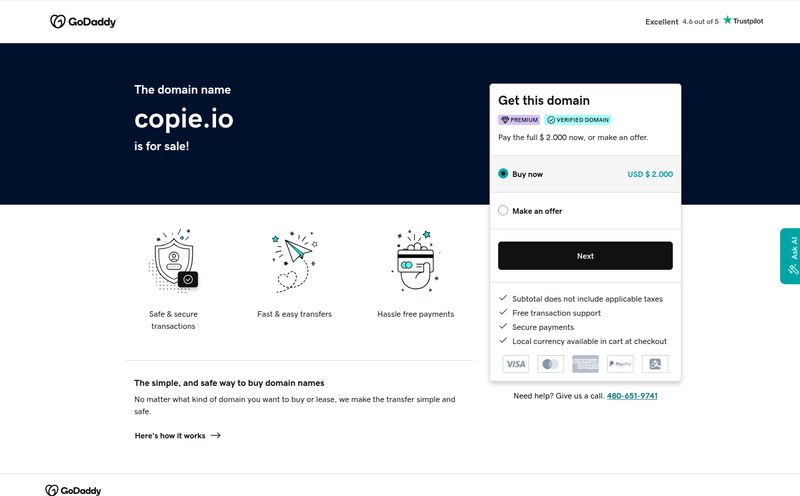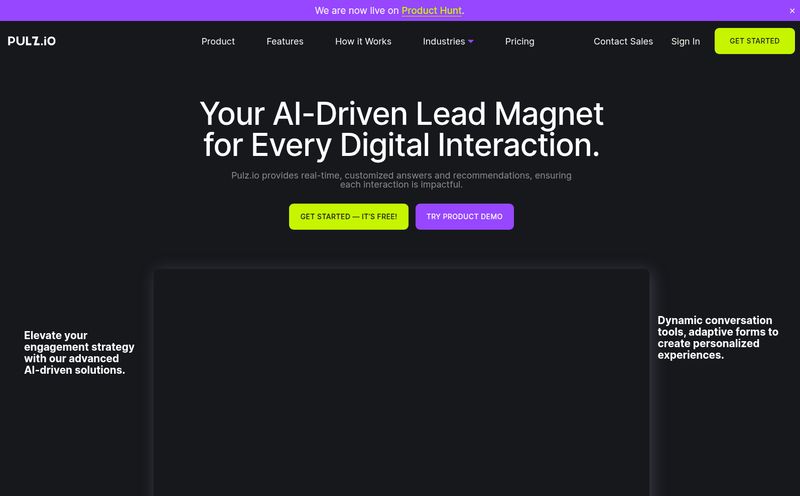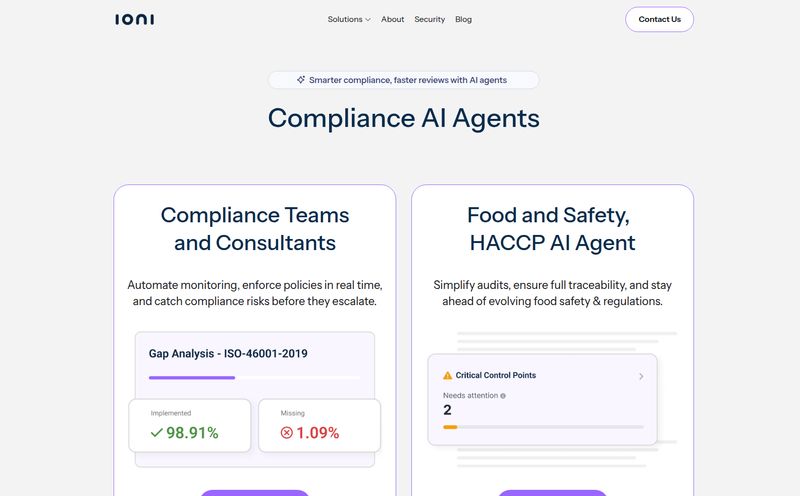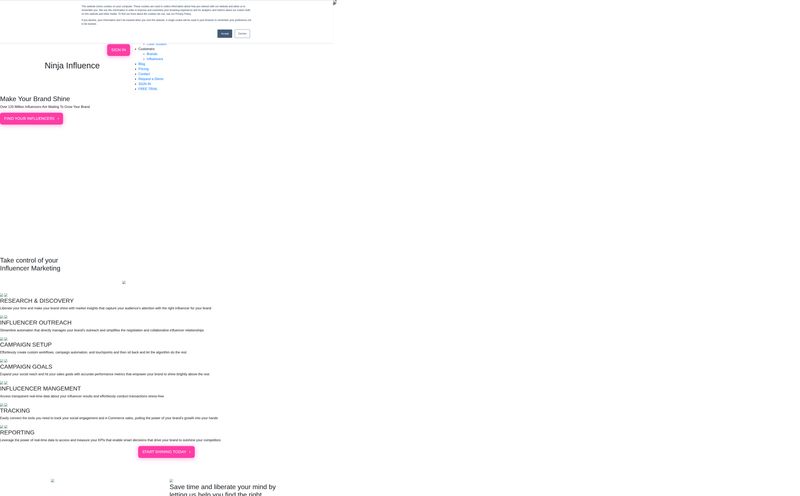We've all been there. Staring at a blank content calendar, sweat beading on our foreheads, trying to pull the next big idea out of thin air. Or maybe you've just launched a campaign you thought was brilliant, only to be met with... crickets. The truth is, for years, a huge chunk of marketing has felt like educated guesswork. We throw spaghetti at the wall and see what sticks.
We scroll through Reddit threads, spy on competitor comment sections, and try to decode the chaotic noise of social media. It’s like trying to hear a whisper at a Metallica concert. Exhausting, right?
So when I first heard about buzzabout, an AI tool that claims to distill actual, meaningful insights from all that social chatter, my professional skepticism immediately kicked in. Another AI promising the world? Sure. But as an SEO and traffic guy, I'm a sucker for data. I had to see for myself if it could actually deliver.
So, What Is Buzzabout, Really?
Okay, let's cut through the marketing jargon. At its core, buzzabout is an AI Audience Insights Tool. Think of it less as a simple social media monitor and more like a translator. It listens to thousands—even billions—of public conversations happening across platforms like Reddit, X (yep, still calling it Twitter sometimes), LinkedIn, and more, and then translates that raw, messy data into something you can actually use.
It’s designed to answer the questions that keep marketers up at night: What are my customers really struggling with? What are the unsaid things they wish my product did? What new trends are bubbling up before they hit the mainstream? Instead of you manually digging for these golden nuggets, buzzabout uses AI to do the heavy lifting, serving up the pains, gains, and honest thoughts of your target audience on a silver platter.
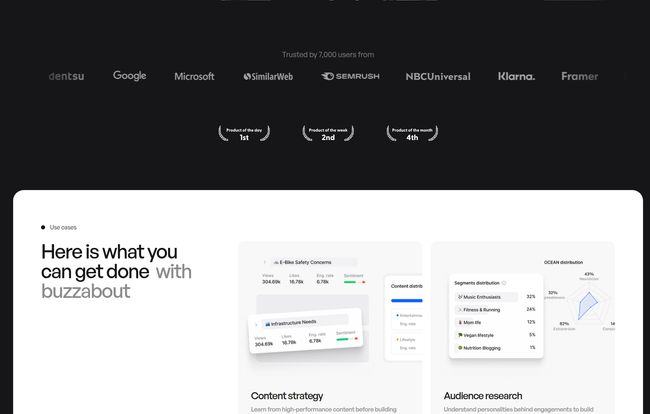
Visit buzzabout
Moving Past The Data Graveyard
I’ve used a lot of analytics platforms in my day. Most of them give you charts and graphs that look impressive but don't always lead to action. It's what I call the "data graveyard"—tons of information, zero insight. This is where buzzabout felt a little different. It's clearly built not just for data scientists, but for people who need to do things with the information.
Crafting Content That Actually Connects
One of the first things I looked at was its application for content strategy. The tool helps you research keywords not just for volume, but for the opinions attached to them. Imagine you're a SaaS company selling project management software. A typical keyword tool tells you "project management tips" is a good topic. Buzzabout, on the other hand, might tell you that a huge number of people on LinkedIn are complaining about "the pain of integrating new software with their existing stack." Boom. That's not just a topic; that's a headline, a webinar, an entire content pillar that speaks directly to a real, felt pain point. It's the difference between shouting into the void and having a real conversation.
Understanding Your Audience Beyond Demographics
Audience research is another big one. Buzzabout provides metrics like a resonance score and sentiment analysis. This helps you understand not just who your audience is, but how they feel. Are they excited? Frustrated? Sarcastic? Knowing this emotional context is gold. It helps you tweak your brand's voice, refine your messaging, and build a community that feels understood. You can even analyze specific social accounts to get the context behind a community or influencer before you engage.
The Buzzabout Pricing Structure
Alright, let's talk about the investment. No tool is great if it's completely out of reach. Buzzabout uses a tiered model, which I appreciate. There’s a path for almost everyone.
- The Free Plan: This is your entry point. At $0/month, you get a feel for the platform. It's limited to Reddit (which is a goldmine for honest opinions, btw), allows 3 reports a month, and gives you a 3-month lookback on data. For someone just dipping their toes in or a student working on a project, this is genuinely useful.
- The Researcher Plan: At $20/month, things get serious. This opens up access to X, LinkedIn, Instagram, TikTok, and YouTube. You get 30 reports per month and a full year of data lookback. This feels like the sweet spot for freelancers, solo content creators, or small business owners who need consistent, quality insights without breaking the bank.
- The Pro Plan: For $90/month, you get unlimited reports and custom date ranges. This is for the power users—the marketing agencies, the in-house SEO teams, the brand strategists who live and breathe this stuff. The ability to pull unlimited reports is huge when you're managing multiple clients or running deep-dive competitor analysis.
- The Team Plan: At $209/month, this is the enterprise-level solution. It builds on the Pro plan with features designed for collaboration across larger organizations.
They offer a 7-day free trial on the paid plans, which I always recommend. Get in there and see if the workflow, well, works for you.
The Good, The Bad, and The AI
No tool is perfect, and a review isn't honest without looking at both sides of the coin. After spending some time with it, here’s my take.
What I'm Genuinely Excited About
The biggest pro is the sheer amount of time saved. The hours I've personally sunk into manual research... I don't even want to think about it. Buzzabout automates the most tedious part of the process. The insights it provides are genuinely actionable. They aren't just vanity metrics; they're starting points for real marketing strategies. The ability to track emerging trends is also a massive advantage, letting you get ahead of the curve instead of just reacting to it.
A Few Realistic Considerations
First off, to get full access to the platforms that matter most for B2B (like LinkedIn) or visual-heavy brands (Instagram), you need a paid subscription. The free plan is a great taste, but the real power is in the paid tiers. Second, like any AI, its output is only as good as the data it's analyzing and the prompts you give it. There's still a small learning curve to figuring out how to ask the right questions to get the most nuanced answers. It’s a professional tool, not a magic wand. You still need to bring your marketer's brain to the table.
So Who Is This For?
In my opinion, buzzabout is a fantastic fit for a few key groups:
- Content Marketers & SEOs: To find resonant topics and understand user intent on a deeper level.
- Brand & Product Managers: To get unfiltered feedback and monitor brand perception in real-time.
- Marketing Agencies: To conduct quick, effective research for new clients and provide data-backed reports.
- Startup Founders: To find product-market fit and understand the language of their first 1,000 customers.
Who might not need it? Probably a hobby blogger or a very small business with an extremely niche, offline audience. If your customers aren't having public conversations online, a tool like this won't have much data to work with.
Frequently Asked Questions About Buzzabout
1. What social media platforms does buzzabout support?
The free plan is limited to Reddit. Paid plans (Researcher and above) add support for X (Twitter), LinkedIn, Instagram, YouTube, and TikTok, giving you a much broader view of the social landscape.
2. Is there a free trial for the paid plans?
Yes, buzzabout offers a 7-day free trial for its paid plans (Researcher, Pro, and Team). This lets you test out the full suite of features before committing to a subscription.
3. How accurate are the AI-driven insights?
The accuracy is generally very high, but it depends on the quality and volume of public data available for your query. The AI is excellent at identifying themes, sentiment, and trends from large datasets. However, it's always a good practice to use the insights as a powerful guide and apply your own industry knowledge for context.
4. Can I use buzzabout for competitor analysis?
Absolutely. It's one of its key use cases. You can analyze what people are saying about your competitors, what their customers love or hate, and identify gaps in their strategy that you can exploit. This is invaluable for positioning your own brand more effectively.
5. Can I export my findings into reports?
Yes, the ability to export your analysis to a PDF report is available on the paid plans. This is incredibly useful for sharing insights with team members, stakeholders, or clients who don't have access to the platform.
Final Thoughts: Is Buzzabout Worth It?
After digging in, I’ve moved from skeptical to cautiously optimistic to genuinely impressed. Buzzabout isn't just another analytics tool; it's a bridge to understanding. It helps close the gap between what brands think customers want and what they actually say they want. It won’t do your job for you, but it can make your job smarter, faster, and a hell of a lot more effective.
If you're tired of the content creation guessing game and ready to listen to what the internet is really saying about your niche, it's definitely worth taking for a spin. You might be surprised by what you hear.
